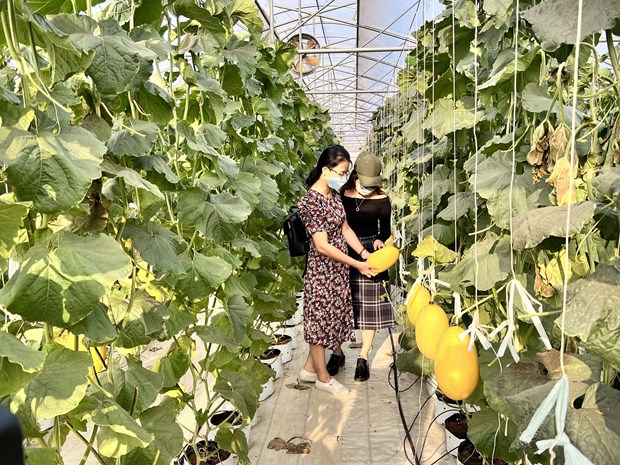 Society
Society

The south-central province of Bình Thuận is expanding organic agriculture to get high added value and sustainable development.

|
| Bình An Farm, a high-tech farm in Hàm Thuận Nam District’s Thuận Quý Commune is one of the attractive tourism destinations in Bình Thuận Province. — VNA/VNS Photo Hồng Hiếu |
BÌNH THUẬN — The south-central province of Bình Thuận is expanding organic agriculture to get high added value and sustainable development.
Under its People’s Committee’s newly-approved plan to develop organic agriculture in 2021-30, the province will develop concentrated organic farming areas for exports and high-tech organic agriculture.
It targets farming areas cultivated with organic methods to reach 1.5-2 per cent of total farmlands in 2025 and 2.5-3 per cent in 2030.
In medicinal plant and forest cultivation, organic products will account for 90-95 per cent of total output.
Medicinal plants are grown mostly in forests.
The province targets organic aquaculture will account for 1-1.2 per cent of its total aquaculture area in 2025 and 2.5-3 per cent in 2030.
It aims for the output of organic animal husbandry to reach 1-1.3 per cent of its total output in 2025 and 2-3 per cent in 2030.
Under the plan, the province has specific targets for producing organic agricultural products by 2030, including 3,000ha of rice, 350ha of vegetables and legumes, 1,250ha of dragon fruit, 500ha of durian, a herd of 6,800 pigs, a herd of 6,000 cows and oxen, and 80ha of aquaculture.
It plans the production value of organic farming will be 1.3-1.5 times higher than non-organic farming in 2025 and 1.5-1.8 times higher in 2030.
To reach the targets, the province will strengthen advocacy activities to raise the awareness of farmers about organic agriculture, and guide legal regulations and organic farming criteria.
It will boost the transfer of advanced organic farming techniques for farmers, co-operatives groups, co-operatives and companies.
It will develop organic farming models, build brand names and promote trade for organic agricultural products.
It will develop linkages among co-operatives and companies to develop value chains for organic agricultural products.
Potential
Bình Thuận has untapped potential and advantages for developing organic agriculture since it has sea, forests and flat farmlands which are favourable conditions for establishing concentrated farming areas.
Phan Văn Tấn, deputy director of the province Department of Agriculture and Rural Development, said with the potential and advantages, the province has determined the development of organic agriculture is a necessary trend to improve the quality of agricultural products and protect the environment.
It has many farmers, co-operatives and companies growing rice and other agricultural products under organic methods.
The Đức Bình Agriculture Service Co-operative in Tánh Linh District’s Đức Bình Commune, for instance, is growing 50ha of organic rice.
Nguyễn Anh Đức, director of the co-operative, said his family grows 20ha of organic rice and uses organic fertiliser, natural minerals and other natural methods to improve soil fertility.
His co-operative’s Đức Lan rice is a well-known brand name rice in Bình Thuận.
Giáp Hà Bắc, chairman of the Tánh Linh People’s Committee, said the district has advantages of weather, climate and water resources, and has developed many organic rice farming areas and high tech farms which offer high incomes for farmers.
The district is one of the province’s major rice farming areas and has more than 8,200ha of rice, growing various high quality rice varieties, including ST25, one of the world's best rice varieties.
“The district will develop agriculture production toward organic and clean farming and develop linkages in producing and consuming agricultural products,” Bắc said.
The province has four companies, one co-operative and one household that have been granted international-level organic certificates for 123ha of dragon fruit and 4ha of grapes.
The Thuận Tiến Co-operative in Hàm Thuận Bắc District’s Hàm Liên Commune has 10ha of dragon fruit that was granted the certificate of EU organic standards.
The Bình An High-Tech Agriculture Company Limited in Hàm Thuận Nam District’s Thuận Quý Commune, for instance, has 3ha of dragon fruit and 4ha of grapes granted certificates of USDA and EU organic standards.
The company also offers tourism services at its fruit farm in which tourists are introduced to the processes of growing dragon fruits, grape and honeydew melon. Tourists can harvest the fruit and buy them.
Mai Thị Ngọc Ảnh, deputy chairwoman of the Hàm Thuận Nam People’s Committee, said to develop agriculture and rural tourism, the district has zoned to develop its agriculture and rural areas in combination with tourism development.
“The district has instructed relevant agencies to strengthen the linkages among tourism destinations and tours in the district and promote its agriculture tourism,” she said.
To develop rural tourism, the province’s Tourism Promotion Centre in co-operation with Hàm Thuận Nam’s Hàm Mỹ Commune has developed a tourism model at Nguyễn Văn Chín’s dragon fruit farm.
Visiting the farm, tourists can participate in tending and harvesting dragon fruit, eat the fruit and other dragon fruit related products and drink its fresh juice.
The province is the country’s largest dragon fruit producer and had 26,977ha of the fruit, including 9,000ha planted to VietGAP standards and about 500ha planted to GlobalGAP standards, by the end of last year. — VNS




